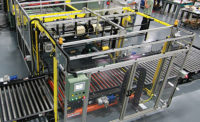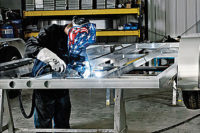Letters matter to welders. A, B and C, for example, are grades that employers use to determine a welder’s current ability, work assignments and pay scale. Letter A is the highest grade, followed by B and C.
Also important are the letters AWS, which stand for the American Welding Society. The organization offers a wide range of certificates to welders who pass specified tests. Because OEM and Tier 1 customers increasingly require their products be welded exclusively by AWS-certified welders, those with this certification have an advantage over fellow workers and job seekers.
William Maxfield and Eric Coleman learned the importance of AWS certification as welding students at different Ivy Tech Community College campuses in Indiana. Maxfield became AWS certified and completed his two-year associate degree in industrial applied science in May 2011. About two months after graduating, he was hired by Ottenweller Co. Inc., based in Fort Wayne, IN, as a Grade C welder. After 90 days, Maxfield passed Ottenweller’s Grade B test.
Coleman became AWS certified after completing an eight-week welding class at Ivy Tech Corporate College in February 2013. He has worked at Novae Corp.’s Columbia City, IN, manufacturing facility since March 2013.
“As someone with no prior welding experience, the class exceeded my expectations,” says Coleman, age 29. “Not only did it teach me how to weld correctly. But the certification, and market demand, enabled me to get a job in just two weeks.”
“I was fascinated by welding and took it to heart,” says Maxfield, noting his limited TIG welding experience at Alcoa AFL Automotive a couple years before starting the class. “I was age 37, proving you can teach an older dog new tricks.”
Ivy Grows in Indiana
Celebrating its 50th anniversary this year, Ivy Tech was founded as Indiana Vocational Technical College. In 1995, the name was officially changed to Ivy Tech State College. Four years later the school entered into a partnership with Vincennes University to form the Community College of Indiana.
After the partnership ended in 2005, Ivy Tech was rechartered as a system of community colleges and renamed Ivy Tech Community College of Indiana. It has many affiliations with two- and four-year colleges around the state, encompassing 30 campuses in 14 regions.
Ivy Tech provides technical and vocational education and training for various industries through its academic programs and corporate college. Training offered by the corporate college is customized for employees of corporate clients. Most of the training emphasizes manufacturing, including Six Sigma, lean manufacturing, CNC machining and welding.
Jim Aschliman, executive director of Ivy Tech Corporate College, says his institution offers an 80-hour welding class. The class enables students to become AWS certified in one or more specialties of MIG welding.
Students pay nothing to attend. Funding comes from either the federal Workforce Investment Act—for individuals with little or no prior welding experience who have been recently laid off or downsized—or from federal Trade Adjustment Assistance (TAA)—for workers whose jobs have been affected by foreign imports. The community college offers this and other welding classes as part of a two-year associate degree program.
More than 90 percent of students pass the class, which has been offered for nearly 20 years.
John Christman is chairman of the industrial technology and welding program at Ivy Tech Community College, as well as the school’s AWS-certification coordinator. He learned welding at Ivy Tech in 1975, before graduating in 1976. He then spent the next 23 years as a welder in various industries—including railroad and auto—before accepting an adjunct faculty member position at Ivy. In 2005, he began his current full-time position.
Christman says the 80-hour welding class emphasizes MIG welding but introduces students to other common types of welding: TIG, oxy fuel and stick. The class also covers metal fabrication, blueprint reading and creation, and requires students to make a 10-minute presentation on any topic pertaining to welding that other students can learn from. The final class is the AWS certification test.
“Each class session lasts five hours, and nearly four hours is spent actually welding,” notes Christman. “Students weld real-world parts, including those with less-than-perfect joints. In fabrication class, they make things used in the real world, such as a 13,000-pound-capacity car trailer and a habitat used in an animal sanctuary.”
Ivy Tech purchases its welding equipment from The Lincoln Electric Co. and Miller Electric. It gets consumables from Praxair. A robotic welding cell has recently been donated to the school, and Christman is hopeful that cell programming will eventually be incorporated into the welding program.
Besides offering the 80-hour class, Ivy Tech Corporate College custom trains welders who work for the college’s manufacturer clients. According to Aschliman, the college completed 27 welding projects for five clients last fiscal year (July, 1, 2012 to June 30, 2013), involving 109 workers. He estimates the college has helped hundreds of manufacturers—and thousands of workers—over its 45-year history.
“Often, the manufacturer needs to either improve the quality of its welding for a customer or make sure its welders have a very specific AWS certification,” says Aschliman. “Our certified welding inspector observes the welders at work and determines exactly where they need help. Sometimes their welding is good, but not good enough to pass AWS inspection guidelines.”
Workers are trained at Ivy Tech or the manufacturer’s facility by an Ivy Tech AWS-certified welding instructor. Training days, time and duration are strictly up to the client. For example, a couple years ago welders on the third shift were trained at 3 a.m. at a local General Motors plant.
“One Angola, IN, client that made palletizing equipment had us certify nearly 80 of its welders every Saturday for six weeks in a row,” explains Aschliman. “And many of them had several years of welding experience.”
Learn and Earn
In December 2008, William Maxfield lost his job at Alcoa AFL Automotive in Auburn, IN, as a result of downsizing. The aluminum products plant, which lost market share to Canadian manufacturers, continued to cut jobs every few months and closed for good in March 2013.
Maxfield had been a log yard attendant for eight years. His primary duties included running a press and dumping, weighing, and invoicing scrap materials from the press. He also worked as an engine cradle line inspector, which allowed him to do a little TIG welding and learn about (but not perform) programming welding robots.
The day he was laid off, Maxfield learned from Alcoa that he qualified for the TAA-funded welding program (administered by WorkOne, the state’s workforce service provider). He had 30 days to decide if he wanted to pursue this opportunity. Maxfield leapt at the chance.
There were not enough people registered in January 2009, so he started classes at Ivy Tech in May 2009. Over the next two years, Maxfield went to school full time and completed several welding classes. He also worked part time as a waiter.
“I liked that the classes introduced us to real-world experiences, including making welds according to what’s on a blueprint,” explains Maxfield. “The limited class size of no more than 15 students allowed us to get frequent and helpful teacher feedback. Sometimes the teachers got tough on us so we understood that a supervisor will do the same on the job.”
Another thing Maxfield liked was that each welding class was taught by a different instructor. This variety provided different perspectives on welding. Maxfield’s instructors included a retired aerospace engineer, Christman and Dan Nichter, who is Ottenweller’s certified welding inspector.
“I made progress every day in class, and I make progress every day at work,” notes Maxfield. “As soon as Ottenweller offers the opportunity to be a Class A welder, I’ll take the test.”
The customer is always right, the saying goes, and Eric Coleman would agree with that. Late in 2012, a customer at the store where Coleman was working talked to him about the WorkOne welding class at Ivy Tech. Coleman learned more about the class, and seeking a career change, he took the entrance exam. Upon passing, he was forced to wait a few weeks until five people qualified for the class, which started in December.
“I liked everything about the class, especially the extensive teacher-student interaction,” recalls Coleman. “The first couple sessions we just learned about welding, but after that we had tons of hands-on welding and practice.”
Coleman says learning overhead welding presented the toughest challenge. He acknowledges that it took him nearly a dozen tries to complete the overhead test weld: filling a 0.0625-inch gap between two 2.125-inch steel plates.
Also challenging was learning specific metal transfer modes of MIG welding. Specifically, he learned how to short-circuit-transfer weld thin materials at elevated temperatures, rather than at the standard low temperatures. Short-circuit transfer welding creates welds with little distortion and residual stress.
Coleman has two AWS certifications. One is for MIG welding with argon and CO2 at ratios of 75-to-25 and 90-to-10. The other is for overhead welding of 18 gauge through 0.281-inch metal, and horizontal welding of 0.125- through 1-inch metal. To maintain these certifications, he must renew them every six months or retake the welding class and pass certification tests.
Coleman welds several types of trailers for Novae. Among the specific parts he welds are I-beams, D-rings, C-channels, shackles, dynamic lane merge components, stake pockets, and a spare tire mount. He also welds the conduit that protects the trailer’s wiring.
“Making good welds from every position is harder than I thought,” concludes Coleman. “It requires focus, good technique and always keeping both hands on the gun.”
Welding Partnerships
For nearly 20 years, Ottenweller Co. Inc. has looked to Ivy Tech community and corporate colleges as a reliable source of trained welders. Ottenweller is a nearly 100-year-old Indiana company that initially was a blacksmith and welding repair shop. For the past 30 years or so, it has been a Tier 1 supplier of structural components for construction, mining and man-lift equipment.
“Our components can weigh up 20,000 pounds and require welding of dozens of parts,” says Michael Ottenweller, president of the company for the last 25 years. “We tell Ivy Tech our welding needs, and they work with us to help meet them.”
Ottenweller says the company currently has 65 welders on staff, five of which were trained at Ivy Tech Community College. One is a grade A welder, and the other four are grade B. More than a dozen welders have graduated from Ivy Tech Community College and worked at Ottenweller over the past two decades. In addition, Ivy Tech Corporate College has trained many Ottenweller welders for numerous custom projects.
“Welding is the heart of what we do,” emphasizes Ottenweller. “Our welders need to be able to provide welds that meet all of our customers’ very specific quality requirements. But with a worldwide shortage of welders, they aren’t easy to find or in the ranks of the unemployed. We need a consistent new crop of talent, and Ivy Tech helps grow it.”
Novae Corp. has 16 welders at its Columbia City facility, where it makes Sure-Trak and several other models of landscape utility trailers. Plant manager Chad Ousley says Coleman is the first welder from Ivy Tech to work for the company, although several welders have completed classes at other technical colleges or high schools.
In addition, Novae trains many welders at all three of its Indiana plants (Columbia City, Markle and North Manchester). However, the company does not require a welder to be AWS certified prior to being hired.
In 2008, Novae instituted a 12-week companywide training program for all new welders to improve weld quality. During the first four weeks, the welders (as a group) learn basic trailer design, jigging, welding and quality requirements.
After each welding assignment, they complete a one-page form verifying completion of all welds. A staff welder then inspects the welds for quality assurance. Inspection duty is performed on a rotating basis among all staff welders and lasts for two weeks.
“During weeks five to 12, the new welders work independently and perform setup and welding,” says Ousley. “After 12 weeks, they are qualified to work alone and train others. We’ve found that you can’t really change the productivity of a welder. But, the program has increased our welders’ efficiency and eliminated any concerns we used to have about quality.”










